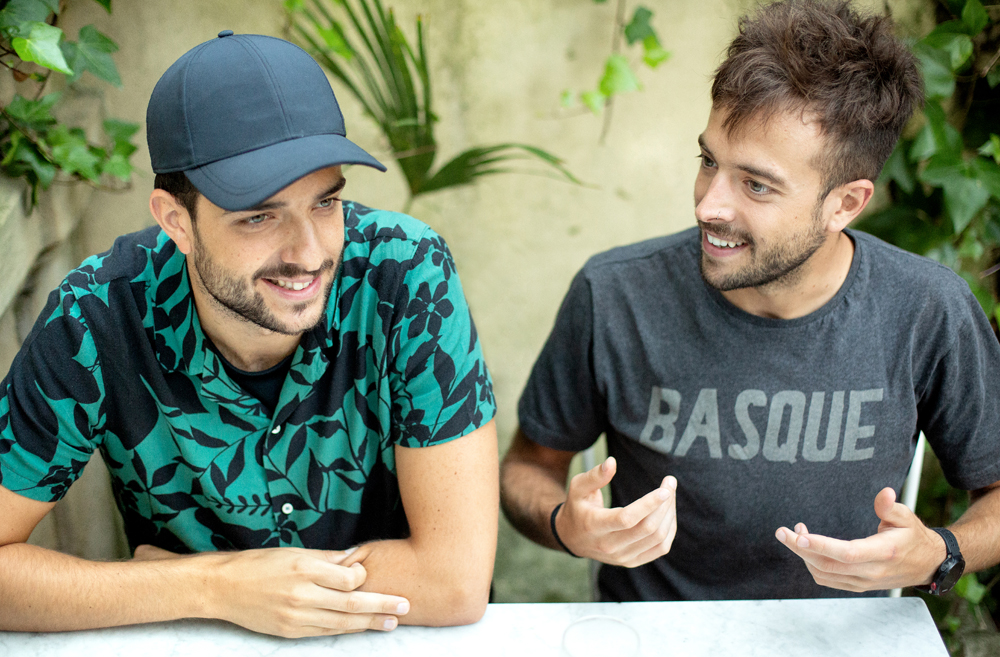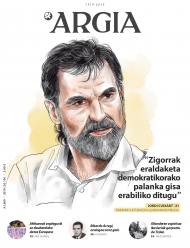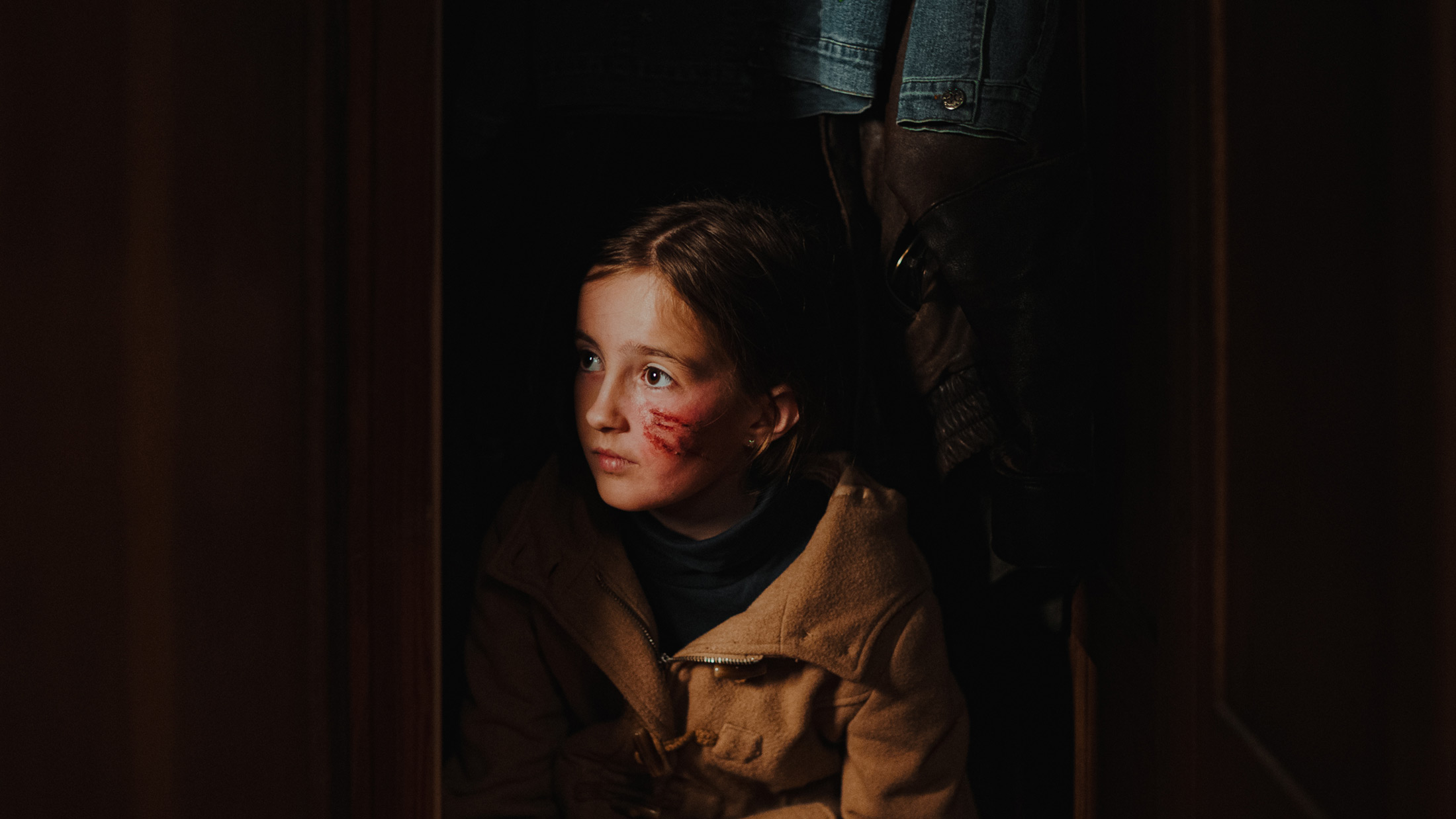"Many ARGIA readers will also see Big Brother"
- In a few years, the Telleria brothers have gone from playing on the couch in front of TV, to sitting on a plateau next to each other. As part of our duo of presenters, they have made a niche in ETB programming. In addition, the contestants of 'Gaztea Irratia' also approach the radio, to direct the Dida program. They recognize that, before they knew her from within, they looked with suspicion at the content that they are doing now. If you've changed your mind, it's not just because you have to defend your work. They say that it has opened their eyes to the linguistic and consumption trends of the young people of Euskal Herria.

It is difficult for those of us who do not know television on the inside to imagine everything behind a programme. How many people work behind Kara?
Julen Telleria: In the production team we will be about 20 people. In addition, it has a technical team of ETB staff. In total, 60 heads are required to perform the test. In that sense, the work of Antton and I is very comfortable. The scripts are written and everything is ready by the time we arrive.
Antton Telleria: What we do is round all of that background work. We put a lot of it on our side at that time when the program is being recorded, but the hardest work is already done before we get there. We are working 60 people and congratulations are received by Aitziber Garmendia and all three. If we are aware of that.
J. T: If people knew how they work, they might be more understandable. The reality is rather bitter. The time and resources to work are very limited.
Julen Telleria: "We need trash in Basque too, then everyone will decide what they are going to see."
A. T: We've also done the same thing: when you make criticism, you don't realize what's behind it. But when you see behind there is a human team of work, it's people like you who do all that, when you see what people's headaches are here...
Is it hard to work for television?
J.T. : Television, at present, and at least in ETB, is in a hurry. As far as human resources are concerned, there is little, especially in the scripts. Antton has visited the Buenafuente program, and there, for example, the writers meet every day, just to take ideas to the street. It doesn't exist in our country. We have three writers and one of them in the middle of the day. Among them, they have to write four programs every week. In the end, like making screws in the factory: you have to get the job done and there is no time it could take: discuss, make ideas patrons…
It is also said that there is a lack of ideas…
A.T.: What's missing is a scriptwriter quarry that will work a long time in the field -- a school like this. People leave because they're not well cared for. And it's key: you need scriptwriters and then everything else. There are no spaces to play, to try things, to learn… There is no risk in that sense. People should be allowed to do so. If the writers aren't happy, it's very difficult to do entertainment, and let's not say humor.
J.T. : Today, thanks to universities and training centers, there are very good people who know how to edit videos. And a lot. But when it comes to writing, and in Basque, there's no scriptwriter industry. I believe that there, both universities and ETB have a responsibility. Let's worry more about this, because today with a phone you can record almost anything, but you have to write, you have to have ideas.
Do you see television?
J.T. : We have always been very fond of television. We've consumed a lot at home, it's been our little pleasure. Today, at home, I always turn on television. I have ETB1 automatically, but if I'm not going to see what's there, I'm going directly to digital platforms. We've already discarded the zapping that we once had rooted in.
A.T.: I'm a total millennial at that. In Bilbao, on the student floor, we saw a lot of television. But I went to Erasmus and there we had no television. I started using Youtube to watch things, and since then, I've barely returned to television. The room has lost that intrinsic value that I had before: going to my room, taking the phone, and there I see what I want, and also television shows.
Antton Telleria: "We're on the roll uncle's role every time we want to reach young people."
Looking for referents?
A.T.: Yes, of course. David Broncano, Berto, Andreu Buenafuente… I have been accused of Broncanism. Now I'm a little bit untouchable because I realize I'm very prone to imitation. If I follow someone a lot, then when I talk about myself, supposedly spontaneously, I get a lot out. Seeing Illustrious Ignorant or Modern Life… In the last three months, I have started to see other things, also to change, because in one way or another those I see almost every day are too present in my voice.
J.T. : I am more Buenafuente. But, even if it is otherwise, they are a great reference [Xabier] Usabiaga or [Xabier] Euzkitze. I'm not going to copy your style directly, but I do think we say some things as they would say. Sometimes at the limit of parody, but without losing the reference character.
Are we more indulgent with the content that is made in other languages than those of Euskera?
A.T.: Our parents or uncles had to fight to teach Euskera. That has also left us a small burden. It seems that the Basque Country is not a tool for making nonsense, which cannot be used in any way. In Spanish, on the contrary, because they have not had to suffer that oppression, they do everything and in any way, without complexes. Here, some of you have that vision. “The Basque is our treasure, and beware of what you do.”
J.T. : We are very concerned about controlling our content and do not care if they are made in other languages. But with the data in hand, those are the programs that you see in the Basque Country. The one who follows Urtzi Urkizu knows what audience data Telecinco and the Spanish team provide. Among those who read the light, many will see the Great Hermano.Esta is reality and we cannot keep it under a blanket. We also need trash in Euskera, then everyone will decide what they're going to see.
A.T.: Not everything is worth it. We know that we can influence people's consumption trends and try to use it. At the same time, however, it is also legitimate to work in favour of the current with a linguistic objective. If people like this, we won't do exactly the same, but we'll take a lot of things out there and bring them to the Basque country. Perhaps we will not be very proud of what we have done, it will not be what we would do for us, but we are aware that we also make our contribution.
J.T. : We already had Basque idols in adolescence, but now, at the time of Youtube and Instagram, the youngest seek idols out. Who and why they are, it's also a big issue, but there's a small achievement that you can also learn to create some for the Basque.
Julen Telleria: "It's not easy to work at ETB and feel part of the Basque community"
In youth you do that road, not without controversy…
J.T. : In Gaztea we have Jon Gotzon, who uses phrases in Spanish. And people tell us. “I am delighted to hear your program, but I am Euskaldun and I don’t have to suffer that in a chain in Euskera.” I may not have to endure, but when I started at ETB I realized that reality is very different from what we believe the people who live in the Basque area. If everyone were like us three, the Basques would be saved. But the reality is very different and hard. We can't fortify ourselves in the laundry.
A.T.: All of this, from a linguistic factor, but there is also more. For example, La Vida Moderna has a great success, but it is not hegemonic throughout Spain or in all Spanish speakers. People, above all, are made offensive and unclean, but as there are many, there's enough critical mass for that humor to make the way, and also to fill a stadium. In Euskal Herria, the linguistic landscape is like this, we are much less in number, and, of course, also among us, that kind of humor is brutal and offensive. Well, after all these filters, there's a very small amount left. Perhaps an essay like this would not be enough to make way. That is why I think we should be more tolerant, because otherwise only the general and the white can be done. At least from the public media.
Is it a limit that ETB should be a public chain in this respect?
J.T. : In many cases yes. When we did, and Gutarrak, I was just a presenter. But I know we had meat, blood, sex -- a lot of things that, if they were published, would give us a lot better data about success and audience. But it's a public television, and we don't use it. I don't know if it's good or bad, but that limits a lot of things.
A.T.: The comedians I follow are very clear that they are not there to educate anyone. That this responsibility is the responsibility of others: teachers, universities, institutions, parents... The humorists are there to make people laugh, play, bother... I am not going to go down paths that I think are wrong, but in ours, in addition to those limits of each, many others come outside. It also has it of self-censorship. In the session, something happened to us: think something and say the director: “No, just in case you don’t say it.”
J.T. : The problem is that the only generic television we have in Basque is public. Because it has both public and private roles to play. If we had both, the private would allow another tone, other content, other less general bets…
A.T.: Most of the formats that succeed among young people are private platforms. There, too, companies set limits, of course. Or the one that advertises. But they're willing to risk, and that's what an audience gives them. They use a much weaker tone. How are we going to reach out to young people if we cannot say what young people are saying? If we can't do what young people do? We're in the role of a rolled uncle every time we want to reach young people, and not as it should be.
In your work, are the hearings still weighed today? Do you look every morning?
J.T. : More than needed. But we must not forget the audience. A balance must be sought which is very difficult. In our case, for example, and I've been on television for five years, we've had pretty good numbers. But there are many programs that remain on the road of the third week. Does the audience have to be conditioned? Also, but maybe not so much.
A.T.: The paradox is that in that we look like a private chain. If we are public, it may be up to us to give a certain peace of mind to the sessions, to have a more long-term strategy… If you are told to take a course, with a guarantee, with the possibility of having a tour, you may find a way to work. But now, if it doesn't get good results right away, it's over.
J.T. : But it is true that television, even if it is public, needs viewers. It's useless to make a program for anyone to see later. And it seems to me that viewers too have a bit of responsibility. If the hearings increased, the resources would also increase, and probably also the quality of the programmes. In a way, it is up to all of us to lift it up.
Are visits on the network also taken into account? Considering that the average age of ETB viewers is 64 years, some projects aimed at young people are born almost dead if not…
J.T. :Here too we are too late. You need an on-demand platform, but we should make more use of Youtube. We are creating content, but they are not disseminated properly.
A.T.: There is another servitude, because it is a public institution. They tell us: “We are forced to have so much click on this website, or we need it to be so to receive a subsidy”…
J.T. : One thing is the content and another the channel, and we can argue a lot about the content, but in the ways of transmitting the content we are late. Instagram and Youtube. There are the spectators and there you have to be the last. I can understand that there are subsidies and the like, but the young man who wants the content does not care, and if he is not given facilities, he will choose something else. The director of BBC Radio says that it is no longer good to attract the public, we have to move to the places where they operate. For example, the young man already does that job.

You work on both sides. Why is Basque radio more successful than television?
J.T. It has to do with the business structure. I do not know Euskadi Irratia so well, but we, for example, have almost absolute freedom, unlike what happens on television. If we are five partners in a program, we do what we want. At the moment and without consulting anyone. The business structure makes everything much more bureaucratic on television. I think that's why we're going faster on the radio. Television is much bigger than radio, there are more hands and the steps are much slower.
A.T.: On the radio, you can also make a decent program with fewer resources than everyone else. We can make a program similar to Being. But on television, we can't compete with the realization of a survivor's gala, or with a super challenge that is made in El Hormiguero with Will Smith. The limits of resources are much more evident on television than on radio.
J.T. : Think, we have managed to be leaders of our league in the realization of a radio in Euskera. This is often said by our responsible party: Can we imagine ETB1 above Telecinco? It seems impossible. We have achieved this with radio.
We have already mentioned before that ETB1 has approached the models of success in Spain, and perhaps also Gaztea. From the outside it seems that you are a nice face of this trend: two young tolosarras, Euskaltzales, members of the Basque community…
J.T. : What happens to us is that we are still young, that we have strength. At ETB there are many people who have received a lot of wood, who have their back warmed and who are disappointed with the Basque community. We are still healthy and willing to take those risks. We have felt highly valued for the work we do, but it is not easy to work at ETB and feel part of the Basque community.
A.T.:It's true. Suddenly we are there, two guys, the grandchildren of Grandma María de Belauntza, the ones we have always done in Euskera, the ones we go to the Durango Fair… And then we have a certain permissiveness: they forgive us things that perhaps others would not forgive. But it's hard to see that people somehow forgive us for life by seeing where we've come from. I put myself in someone else’s place, and if my parents were Castilian speakers, if they had other references…
Antton Telleria: - How are we going to reach out to young people if we cannot say what the young people are saying? What if we can't do what young people do?
J.T. : In our trade there are people who don't care about anything, but that's not why they're bad people. They can be very good professionals. All of them are often left out of our community, and I don't know if it's fair. It is essential to know how to use language, but from there, the Basque world, or a part of the world, should be more open.
To some extent, Cincts Kara makes that effort to bring two worlds together. The format is light, dynamic, but many guests are writers, film directors…
A.T.: What Locks Kara has done is to welcome people from a very specific world and bring them into contact with another world. And there are probably people who have met wonderful people thanks to the program, body builders, etc.
We have mentioned many references and many names. Almost all of them are Spanish.
J.T. : Culturally, in general, we are all very Spanish in the South.
A.T.: In the last year I have stopped this a little on purpose, and I have started to consume English content: both humorists and series… If not, you always have to pass the filter of the Spaniards to receive something.
J.T. : Let us admit as soon as possible that we are very Spanish. Let's not head blindly against the wall. I find it harder to reach people and make them feel up close when you're trying to create your own bubble. It is better to touch the external references, also the Spanish ones, and include other contents. For us, moreover, the first challenge is to influence all the young people who have Euskera in general academic and foreign. To get closer to them, we need Spanish references, but we also need to include another content.
A.T.:At the same time, we have to combine it with a more critical character and understand that we have a space that we can use in public. We are trying to make the most of the Basque referrals. In any case, for example, it hurts me to be in Spanish.
J.T. They have to be included. You have to play more with that, because oftentimes it's what makes us closer and also attracts us. But of course, in addition to that, Antton has created three new words in Euskera every week, and those are other words that you have to get in. But the real contribution is made by bringing these two together. As long as you're conscious, both what you're doing and the reality that we have.
Not only the Spaniards, all the references we have mentioned are also men. Do you think that being men is easier to make the way through ETB?
J.T. : I have not thought directly whether we have had more opportunities. But I think we have that concern. We try to guarantee, balance, the presence of women in all the spaces in which we participate. And I've seen how many of the women around us are underestimated for being physically attractive, for example, because people come directly to think that's why they're there and not because of their capabilities.
A.T.: If a comedian is a woman, people are much more demanding since it starts, or we are. In this sense, the change has been noticed in the mold that comes from Spain: there are many women, young people, who have started to make humor. There are also programmes run exclusively by women, both on radio and on television. In Euskal Herria, we're still behind that. We have Aitziber Garmendia, for example, the center of humor in our program. But Aitziber is very good, he puts the level very high, and by comparing it with her, it seems that nobody gives the level. I believe that what it is for us to be aware of this imbalance, and not to try to perpetuate that approach or those attitudes. Or denouncing it, when it touches us, depends on what we see.
J.T. : As far as content is concerned, I also think we take care of it in our programme. We have come to cut the programme because an uncomfortable context has been created, or because it seemed to us that a situation created with a partner or guest has acquired an inappropriate tone. Not just us, especially the session teams.
A.T.: On the other hand, to the extent that television is public, the responsibility for changing these trends is also borne by ETB. Demand that presenters be women, also in entertainment programs. Among the requests that are given to the producers, let it be another…
Mugimenduak mahai gainean jarri du euskarazko edukiak sustatzeko beharra, eta horren aurrean ETBk duen interes falta. Lehentasuna gaztelaniazko saioei ematea egotzi dio. ETB emozioen festa izan dadin, aldatu gidoia euskararen alde! lelopean, aldaketa eskatu dio telebista... [+]
The cuckoo lays its eggs in the nests of the petirreds. After laying, the cuckoo does not feed and grows to your puppy, as the robin takes care of it.
I don't know how many years of survival the cubes have. I know that the bird in our house is over 40 years old and unfortunately... [+]
Berrian lan egiten duen kazetariak, Euskal Telebistaz liburua idatzi berri du Txoria hodei artean, ETB lehen eta gero. Galdera batekin abiatzen du liburua kazetariak: 40 urte bete dituen Euskal Telebistak behar den gisan arrapostu ematen al dio euskal jendartearen egungo... [+]
The news I read a few weeks ago prompted me to address this issue: ETB3’s decision not to extend Ene Kantak’s children’s program at ETB3 surprised me and I still do not understand it, being an orderly and appropriate program.
I see very little television in recent years,... [+]























